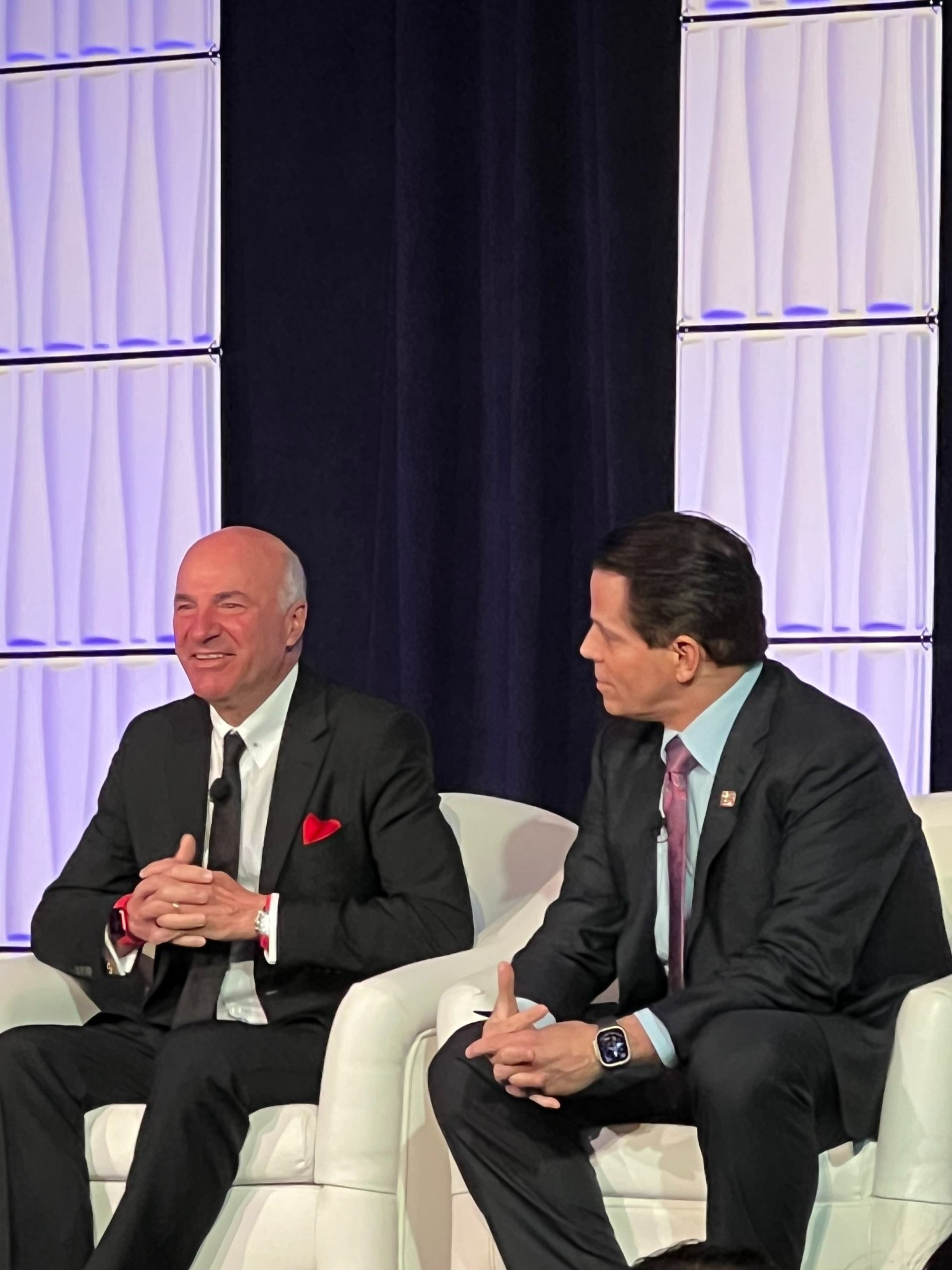FTX Recriminations and Regret Vie with Optimism at Benzinga’s Future of Crypto Conference in New York
Scenes from the latest crypto conference in the Big Apple

“It’s like going through a war together.” Crypto camaraderie was on display last week
Losing nearly $10 million in the collapse of FTX will leave a mark.
“I’m one pissed-off cowboy with a lot of lawyers,” said Kevin O’Leary, celebrity investor, crypto enthusiast “Mr. Wonderful” on the TV show Shark Tank. “We all look like idiots.”
He was speaking onstage last week to kick off the Benzinga Future of Crypto conference in New York. He was joined by Anthony Scaramucci, who sold 30 percent of his investment firm SkyBridge Capital to FTX. Yet both remain bullish on crypto.
Scaramucci made comparisons to the early days of the internet. “You have to think long-term about this stuff. The internet was clunky in 1998 but it’s brilliant in 2022,” Scaramucci said. “When you have new product innovation, you also get charlatans. This happens in every industry, all the time.”
Still, he said it could be a huge mistake to write off crypto. “I have contemporaries of mine that left the Nasdaq in early 2000 after the dot com crash. They swore off tech stocks,” he said. “They missed out on the greatest investment in U.S. economic history in the ensuing 22 years.”
O’Leary is a proponent of regulation that’s smart and doesn’t overreach and said more certainty is needed in the markets. “Any unregulated exchange is uninvestable for an institution,” he said.
He believes we’ll see consolidation among tokens which will lead to more capital chasing fewer positions. Capital appreciation will likely follow and asset prices will rise.
We’re in a soul-searching phase
Others compared FTX to a forest fire.
“You need a brush fire to lead to stronger trees,” Art Malkov, an advisor at the Columbia Lab-to-Market Accelerator Network, said. “Despite everything that’s happened in the past six months, crypto, as an underlying technology, didn’t falter whatsoever. It worked flawlessly and did exactly what it’s supposed to do.”
While fire is painful it’s needed for healthy growth, said Katrina Gamueda-Smith, chief of staff at Vayner3, Gary Vaynerchuk’s web3 company. “This is where we’re at with web3.,” she said. “It’s like a forcing mechanism to challenge us to evolve, think differently and take on new challenges. External forces remind us why we’re all here in the space.”
This cautious optimism filtered through every session throughout the day. Aptly named, the conference was about the future of crypto, not FTX and its faults.
Brands will take web3 mainstream
Malkov, Colombia’s Lab-to-Market Accelerator Network advisor, and moderator, Megan Nilsson (Crypto Megan) made a prediction: the next 200-300 million web3 users will come from brands. Mainstream consumers will adopt the technology, often without realizing it, such as with the Starbucks rewards program.
“What if Amazon or Apple decide to integrate blockchain technology? A mindset shift will occur. People will trust it because the big companies do,” Malkov said.
Yep, it’s a conference
For mass onboarding to occur, the user experience needs to be accessible, approachable, frictionless and safe.
“We’re going to see many more loyalty programs that just feel like better versions because now there’s an asset created out of the rewards,” said Naimul Huq, senior vice president of operations at Vayner3. He also praised Reddit for issuing over three million digital wallets.
“The fact that Reddit flipped the narrative and took an audience that was vehemently opposed to this technology, onboarded them and turned them into defenders of the tech, is exactly the playbook that brands will follow in the coming years,” Huq said.
The swing from strongly opposed to a place of fandom – which taps into the inherent fluidity among consumers – is something brands must realize.
While the philosophy of web3 rejects any company commanding a monopoly, we can’t overlook the power of brands and our human desire to belong.
NFTs, more than assets and JPEGs
The tangible, real-world application of non-fungible tokens (NFTs) was a focal point of conversation. Keeping the community front of mind was a theme in multiple panels.
The most successful NFT projects aren’t a quick flip but rather a way to get closer to fans. One panel of Bored Ape Yacht Club holders explored why the NFT collection hit a cultural nerve.
Josh Ong, from Bored Room Ventures, said: “The power isn’t the image, but it’s the access and what that opens up. Behind that picture is an incredible community of members who are empowered through individualized IP. It’s my character and I can build it out. I can put it on hot sauces, sneakers or whatever I want.”
NFT holders own a piece of a cultural group and moment in time. It’s a store of culture just as much as an asset. It’s also a chance to bring back play and fun that we so often lose as adults.
Greg Solano, the co-founder of Yuga Labs, which created the Bored Ape Yacht Club NFTs, said they wanted to make a fun, inclusive club that leaned into strangeness and irreverence.
“We’re chasing after the wildest, weirdest, creative ideas possible,” he said. “We’re not really a tech company. We’re creative driven. This is a whole new medium opening up to the world. We take a community-first approach and make it so people can derive value from their contributions to the ecosystem, then the self-fulfilling cycle is strong enough to overcome anything.”
Solano said he’s most excited about Otherside, the open metaverse they’re building as “another outlet for connection.” Solano’s keynote was an optimistic note to end the day on.
While this year’s blows are heartbreaking, the consensus at Benzinga was of optimism and excitement – looking ahead all the wiser after 2022’s hard lessons.
The spirit of the American Dream is ownership. Web3 is ownership. This is the era of individual liberty, not the end of it.

